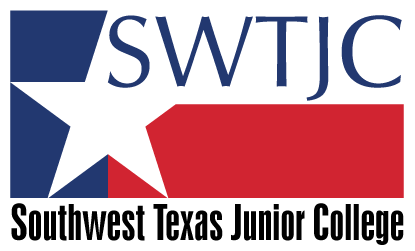3.4.11 Academic Program Coordination
For each major in a degree program, the institution assigns responsibility for program coordination, as well as for curriculum development and review, to persons academically qualified in the field. In those degree programs for which the institution does not identify a major, this requirement applies to a curricular area or concentration.
Compliance Certification Rationale for Judgment of Compliance
For each major in a degree program, Southwest Texas Junior College assigns responsibility for program oversight, coordination, curriculum development and review to persons academically qualified in the field. SWTJC organizes its instructional programs into five divisions: Arts and Sciences; Social and Behavioral Sciences; Business, Industrial, and Technical Studies; Allied Health and Human Services; and Developmental Studies. Each Division is led by a Chair, each of whom has experience as full-time teaching faculty. The Division Chairs report to one of two Deans, each of whom has long experience in full-time teaching and/or administration.
Division Chair responsibilities are outlined in the SWTJC Faculty Handbook. These responsibilities include leading departmental faculty in curriculum development, in the review of curricula, and in needs assessment for new program development. Programs in the Business, Industrial, & Technical Studies Division and in the Allied Health & Human Services Division are further lead by Program Coordinators. Their duties and responsibilities are outlined in the Faculty Handbook and may be unique for specific programs due to licensing or State Board requirements. Deans’ responsibilities are likewise presented in the Faculty Handbook, and include supervising curricula, courses, and methods of instruction.
The responsibility for curriculum development and review is assigned to the SWTJC Curriculum Committee, which is the principal procedural vehicle for program development, review and revision. The Curriculum Committee is composed of academically qualified faculty and professional staff. The Curriculum Committee considers curricular changes proposed by faculty, division chairs, or curricular administrators; makes written recommendations in response to those curriculum changes to the SWTJC Vice President of Academic Affairs; and coordinates program reviews for each degree and certificate program.
A Master Syllabus has been developed by discipline faculty for each course taught at SWTJC. Master Syllabi outline the teaching materials common to all sections as well as common student learning outcomes and course objectives.
The following table indicates the faculty charged with program oversight, coordination, and curriculum development and review.
Off-Site Committee Judgment and Commentary: Non-Compliance
The institution provides evidence that it assigns responsibility for program coordination, and for curriculum development and review. For each of its five instructional divisions (Arts and Sciences; Social/Behavioral Sciences; Business, Industrial, and Technical Studies; Allied Health and Human Services; and Developmental Studies), oversight, coordination, and curriculum development is assigned to Chairs, each of whom have experience as full-time faculty. The duties of the department chair are listed clearly in institution’s Faculty Handbook. The division chairs report to one of two Deans, whose duties are clearly listed in the Faculty Handbook. In addition, programs in Business, Industrial, and Technical and in Allied Health and Human Services are further lead by Program Coordinators. The duties of the program coordinator are also clearly listed in the Faculty Handbook. The institution provides a Program Coordinator Roster that lists each coordinator, their area of responsibility, and their qualifications for coordinating the designated program. Although the majority of program coordinators have the qualifications to coordinate their designated program, it is not clear that the coordinator for Child Development is qualified to coordinate the program based on the credentials provided.
Institutional Response
SWTJC’s Compliance Certificate response only listed the earned degrees for Ms Lorie Compton, the College’s Child Development Program Coordinator. Below we have provided specific relevant coursework as well as professional experience which Ms. Compton brings to the Child Development Program. The College contends that this material documents Ms. Compton’s qualifications to coordinate the Child Development Program. The "Education" link below directs the reader to Ms. Compton’s transcripts for her earned degrees.
Education: BA Multidisciplinary Studies; Texas Lutheran University
MEd Reading; Sul Ross State University
MEd School Administration; Sul Ross State University
MEd Elementary Education; Sul Ross State University
Specific graduate level courses which she completed that align with Child Development are as follows:
ED 6312: Advanced Studies in Early Childhood
ED 6315: Design and Implementation of Instructional Programs
ED 5316: Teaching the Multicultural Learner
EDUC 6313: Teaching Reading in Content Areas
ED 6310: Advanced Studies in Teaching Kindergarten
ED 5308: Elementary Reading
ED 6308: Advanced Human Growth and Development
Specific graduate level courses which she completed which contribute to her position as Child Development Program Coordinator are:
ED 5319: School Law
EDUC 5318: Personnel Problems
EDUC 7313: Practicum in Administration (9 hours)
EDUC 5302: The Principalship
EDUC 5304: Public School Supervisor
EDUC 7307: Advanced Seminar in Administration
EDUC 5336: Instructional Leadership
EDUC 7309: State and Federal Programs in Public Schools
Ms. Compton also hold the following professional certifications which speak to her training in instructional leadership and supervision:
PDAS Certification (no expiration date) - The Professional Development and Appraisal System is the State-approved instrument for appraising public school teachers
ILD Certification (no expiration date) – Instructional Leadership Development is a 36-hours training required of those seeking PDAS certification.
Texas Teacher Certification: Self-contained grades 1-8; Speech and
Communications; ESL; and Principal (Expires 11/30/18)
In addition, she has extensive work experience in the field of Early Childhood and teaching. She was a First Grade teacher for 3 years for La Vernia ISD (Texas); 6th-8th grade Reading, ELAR, Science, and ESL teacher for 9 years for Edgewood ISD (Texas) and an ESL teacher for Arabic children with the Abu Dhabi Education Council (United Arab Emirates) for 2 years.


